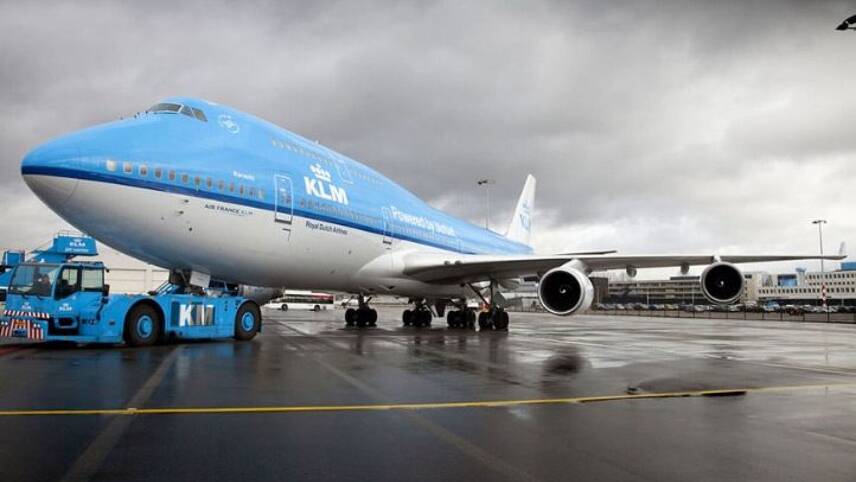Register for free and continue reading
Join our growing army of changemakers and get unlimited access to our premium content

KLM has been investing in biofuel since 2011 but biofuel accounted for less than 0.2% of its total fuel consumption last year. Image: KLM
The advertising campaign in question stated that KLM mixed biofuels with traditional fossil-fuel-based kerosene up to a maximum of 50% and that the airline was “the first to fly biofuel on a daily basis”. It was run in the Netherlands earlier this year.
While KLM has operated a select number of flights with a 50% biofuel blend and, pre-pandemic, was using a biofuel blend on at least one flight per day, biofuel only accounted for 0.18% of its total fuel consumption in 2019.
The Dutch Advertising Code Committee ruled that this proportion should be listed in future advertisements which use biofuel as a selling point and that KLM should re-word its campaign to avoid misleading consumers. The ruling is non-binding.
The court case was brought forward by local teacher Eric Stam, who submitted a complaint as a private citizen. Stay Grounded Network – a non-profit organisation which coordinates campaigns calling for the degrowth and decarbonisation of the global aviation sector on behalf of 160+ members – praised Stam’s work.
“It is great to see some clear rulings now, but most of the time it’s impossible for the public to decipher the industry’s lies, leading to false hope that technological solutions might solve the problem,” said the group’s lead climate campaigner Magdalena Heuwieser.
Stay Grounded Network is planning to take KLM to court again in autumn over the marketing of its corporate biofuel programme after a complaint by Stam about the initiative was lost. The programme enables businesses that have a corporate contract with KLM to pay a surcharge covering the difference in cost between traditional kerosene and biofuel. This money is then earmarked to scale up biofuel production.
KLM states that biofuel still costs up to three times more than traditional kerosene and that it “cannot stimulate the market alone”.
Fuel to the fire
Aviation is only responsible for 3% of global annual greenhouse gas emissions but is regarded as hard-to-abate and, pre-pandemic, was one of the world’s fastest-growing sectors in terms of user numbers and emissions. Emissions from the sector are estimated to have increased by 76% between 1990 and 2012.
As such, businesses and governments are scrambling for solutions to decarbonise the sector. In the UK, at least, biofuels and other sustainable aviation fuels (SAF) are being given more support than electric aircraft and solutions designed to cap growth. The UK Sustainable Aviation Coalition’s recently published roadmap for net-zero alignment relies almost solely on SAF and predicts extensive growth in passenger numbers (70% between 2019 and 2050).
Green groups have discredited the roadmap, stating that it stands in contrast to the Committee on Climate Change’s recommendations on capping growth, electrifying aircraft and developing supporting policy frameworks. But many of the roadmap’s proponents have been invited to sit on the UK Government’s ‘Jet-Zero Council’– a coalition of Ministers, businesses, trade bodies and environmental groups who will collaboratively work to align the aviation sector with the 2050 net-zero target post-Covid-19.
Since the Jet-Zero Council was launched, the Department for Transport (DfT) has launched a £200m fund for projects developing SAF, energy-efficient electric aircraft components, high-performance engines and wing designs intended to minimise fuel consumption. It has been matched with £200m from the industry. Dozens of MPs had been calling for £500m of government funding for SAF alone.
Regarding greenwashing rulings specifically, the last major case involving the aviation sector saw rulings brought against Ryanair by Transport & Environment (T&E).
Ryanair had claimed, in TV and radio adverts aired in the UK during 2019, that it was “low-CO2” and “Europe’s… lowest-emission airline”. The business measures its emissions on a per-passenger basis and states that these claims are true when this metric is used. However, a 2018 T&E report found that Ryanair was the EU’s ninth-highest corporate carbon emitter in terms of absolute emissions.
The UK’s Advertising Standards Authority (ASA) ruled that the “basis of Ryanair’s claims had not been made clear “ and that it had insufficient evidence proving that Ryanair was the lowest-emission airline in Europe by any metric.
Sarah George


Please login or Register to leave a comment.